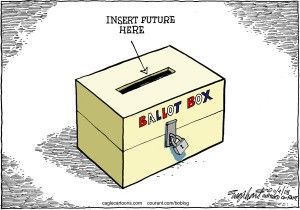Sec State Bowen tweets why she failed to disclose campaign data online
By John Hrabe
Last week, two nonpartisan organizations interested in government transparency had a seemingly simple request for California Secretary of State Debra Bowen: share the state’s campaign finance database in a single, accessible file. The request shouldn’t have been too difficult. Bowen’s office already posts the information on its clunky and crash-prone Cal-Access system.
“We write to request that your office make a simple change that would save costs for the Secretary of State’s office while greatly increasing data transparency in the state of California and public accessibility to important campaign finance and lobbying information,” wrote MapLight and Common Cause, the two organizations leading the public disclosure request. “This change would vastly improve the public accessibility of valuable civic information, reaffirming California’s role as a leader in open government, and showing your commitment to shining a light on money in politics.”
CD-ROM
The poorly-designed Cal-Access system requires users to download each campaign report one-by-one rather than as one massive data file. CalWatchdog.com, which routinely spends hours reviewing campaign reports, understands the organizations’ complaints about the current system. The only alternative to individually reviewing reports is to fork over $5 a day for a new CD-ROM.
Bowen says that an alternative to the CD-ROM option would be too difficult and costly.
“It is not clear to me that creating such a ‘filter’ is cost-effective when designing, developing and deploying it would divert limited information technology resources from other high-priority responsibilities,” Bowen wrote in response to the disclosure request. “This cost-benefit analysis would be different if the data was not readily available in another medium, but it is readily available on a CD-ROM.”
Technology experts predict that the CD-ROM will likely be extinct by 2016, due to rapidly increasing broadband connections, which “means most programs can be downloaded in a matter of minutes, or even seconds.” As Suzanne Kantra pointed out in 2011 at Techlicious, “So, why would you want to pay the extra cost of having a DVD printed, boxed and shipped to your home? You wouldn’t. And in five years it won’t even be an option.”
Phillip Ung, a policy advocate for Common Cause, believes it’s time to upgrade the state’s technology. “21st century voters are demanding our ‘dial-up’ government get plugged into the times and ditch the CD-ROMs,” he said.
Bowen took to Twitter late Monday evening to rebut that criticism, arguing that state law differentiates between data posted online and shared on a disk.
“Point is, what happens on paper and what happens on line are not, under CA law, identical,” she tweeted.
She continued, “If you could legally put it on line, you’d need a *secure* server w/ capacity. We lack hardware, software, + ppl to run things.”
When asked why she wasn’t cooperative with the groups disclosure request, Bowen reply tweeted, “What makes you think I’m not? I’ll do my own analysis first, tho. I was a Girl Scout. I like to be prepared.”
FPPC embraces technology
While the Secretary of State’s office has struggled with new technology, another state agency that is responsible for political disclosure has embraced a tech upgrade. Last week, while the Secretary of State was denying the disclosure request, the Fair Political Practices Commission launched a new gift tracking app for legislators and their staff to keep track of gifts. Under the leadership of Ann Ravel, the FPPC has made technological improvements one of its top priorities.
“We are extremely proud of our latest effort to make the disclosure and reporting rules for officials and employees less burdensome and time-consuming,” said Ravel, who has promised to bring the agency into the digital age. “We believe that the FPPC Gift Tracker will not only assist officials and employees and save their time and resources, but will also help the public to ensure that gift information is disclosed accurately.”
Which raises the question: Why has the FPPC, which operates under the same budget and bureaucratic limits as the Secretary of State’s office, been successful in upgrading its programs?
Bowen, who authored a 1993 bill to make legislative information accessible by computer modem, has repeatedly faced technological failures as Secretary of State. In 2010, the state’s election results website crashed because, in the words of Bowen’s spokeswoman, “The traffic basically blew up the cloud.” This year, the office announced that it was working through a 122-day backlog in processing business filings. The legislature is now rushing through an additional $2 million in special funding to alleviate the backlog.
2014 candidates pounce on the issue
Several candidates to replace Bowen, who is forced to step down due to term limits, criticized the most recent disclosure denial.
“Memo to the Secretary’s office: tear down this data wall!” said GOP Secretary of State candidate Pete Peterson, executive director of Pepperdine University’s Davenport Institute for Public Engagement and Civic Leadership. “In the midst of an open data revolution, our Secretary of State’s office is still stuck in a closed data world.”
San Francisco state Senator Leland Yee, a Democratic candidate for Secretary of State, echoed Peterson’s criticism of the Secretary of State’s antiquated processes.
“While California has long been a tech leader, its government still lags behind,” said Yee. “We should use all the tools we have available to keep the public informed as to what affects the way California is governed.”
No stranger to technology, Yee authored California’s landmark online voter registration law, which allowed citizens to register to vote via the Internet or a mobile device. As of November 2012, Yee’s office reported that more than a million people had used the system.
Derek Cressman, another rumored Secretary of State candidate, declined to comment because he hasn’t formally announced his campaign. However, Cressman’s views on technology aren’t hard to ascertain. He serves as vice president for state operations of Common Cause, one of the organizations that are pushing for the disclosure.
The office of Democratic State Senator Alex Padilla (another potential candidate for Secretary of State) did not respond to a request for comment.
Related Articles
Recall Gov. Jerry Brown
John Seiler: Let me be the first to say it: Recall Gov. Jerry Brown. As I’ve been predicting since last
Is Tom Campbell a "fiscal conservative"?
Whatever else it’s done, Carly Fiorina’s “Demon Sheep” ad against rival Tom Campbell has sparked the first widespread interest in
Students Protest Ed Entitlement Cuts
MAR. 5, 2012 By KATY GRIMES Middle-aged, greying 1960s radicals, pimply faced kids, teachers, throngs of SEIU members, angry Occupy




